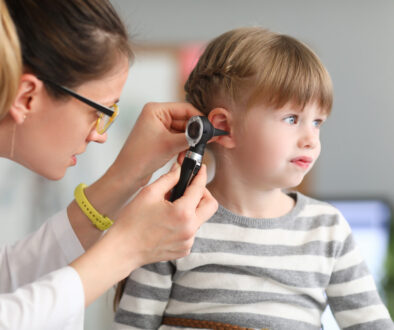What Causes Nosebleeds? And How Can You Prevent Them?
Updated March 2023
Can Allergies Cause Nosebleeds? How Our ENTs Can Help
Nosebleeds can be profuse and dramatic, but the good news is that most of them are not serious. They can certainly be frightening at times, but they are rarely life-threatening. They can occur at any age but are most common under age 10 and over age 50.
While there are many potential causes, our patients often ask us: Can allergies cause nosebleeds? We’ll look at what causes an allergy nosebleed, examine how to prevent them, and what to do when you have one.
What Causes Nosebleeds?
Often, there is no obvious reason for the bleeding and it may seem very random.
However, some factors can cause bleeding. These include:
- Dry air
- Picking the nose
- Chemical irritants
- Nasal septal deformities
- Allergy nosebleeds
- Trauma or injury
- The common cold
- Overuse of nasal spray
- Upper respiratory infections
- Medication such as aspirin and other blood thinners
- Hypertension (high blood pressure)
- Vascular diseases
The medical term for a nosebleed is epistaxis.
The nasal mucous membranes warm and humidify air as it passes through the nose. To accomplish this, the nose has a very rich vascular supply. There is a collection of blood vessels on the anterior septum—the bone that divides the nose– called Kiesselbach’s plexus– where the vast majority of nosebleeds occur.
Have you noticed that nosebleeds are more common in winter?
Heated air and chronic colds can irritate and dry the delicate blood vessels of the nose. Excessive picking, scratching, nose-blowing, and sneezing—which are more common in winter—contribute to nosebleeds.
Can Allergies Cause Nosebleeds?
If you or your child has chronic allergies, your nose may bleed frequently. Those with allergies are very susceptible to nosebleeds.
Why? To answer this question about allergy nosebleeds, it helps if you know how allergens affect the inside of your nose. An allergen is any substance—such as pollen or ragweed—that prompts an allergic reaction.
There are many tiny blood vessels in the nose, and these vessels can be easily damaged, which leads to nosebleeds.
Even something as simple as air moving through the nose can contribute to the problem by irritating the nasal membranes, which in turn, can damage the tiny blood vessels. Allergens dry out your nose, which leads to irritation and allergy nosebleeds.
Antihistamines or decongestants, often used to alleviate allergy symptoms, may also cause a dry nose and create nosebleeds.
In the winter, when the common cold and viruses are more prevalent, nosebleeds are common.
Nosebleeds can occur in the nasal septum (the piece of tissue that separates your nose into two nasal passages) or farther back into the nasal cavity. Infections that are the result of allergies increase the likelihood of a nosebleed.
What Kind of Allergies Cause Nosebleeds?
Almost any allergen that dries out your mucus membranes can cause an allergy nosebleed. The most common culprits are pollen, pet dander, and dust.
Can Stress Cause Nosebleeds?
By itself, stress is not likely to cause nosebleeds. In many cases, it is the response to stress—not the stress itself—that causes the nosebleeds.
When some people are stressed, they may tend to blow their nose frequently or pick at it. This can trigger a nosebleed. Stress can also contribute to high blood pressure, which can be a potential cause of nosebleeds.
Why Are There So Many Nosebleeds in Kids?
Most often, these are caused by dry air or picking the nose. Children may also have minor injuries to their noses from sports or the playground. These are rarely serious but can be very scary for your child.
If your child has a nosebleed, reassure them. However, if the nosebleed doesn’t stop after 20 minutes, or if you feel your child has something stuck in their nose, contact a Raleigh ear, nose, and throat doctor near you, such as a member of our compassionate, dedicated team at Raleigh Capitol ENT.
We offer extensive pediatric ENT services. If your child is experiencing any of the following, we recommend scheduling an appointment with one of our ear, nose, and throat physicians in the Raleigh area:
- Frequent or chronic nosebleeds
- A new medication
- Bruises easily
While nosebleeds are rarely serious, there are some occasions when you should seek emergency treatment. Get immediate medical care if your child:
- Has heavy bleeding in addition to dizziness or weakness
- Has hit their head
- Has bleeding as the result of a fall
- Has bleeding so severe they have difficulty breathing
- Has bleeding that hasn’t stopped after two attempts of applying pressure for 10 minutes each
How to Stop Your Child’s Nosebleed
- First, calm your child. While most nosebleeds are easily controlled, the sight of gushing blood is unsettling.
- Be sure the child is standing up or sitting forward.
- Do not allow your child to lean back: This can cause the child to cough or choke on the blood. If the blood is swallowed, it can cause nausea.
- Take a cotton ball and soak it with Afrin, Neo-Synephrine, or Dura-Vent. Then place the cotton ball into the nostril. If you don’t have access to these medications, pinch the tip of the nose and the portion of the nostrils below the bone.
- Pinch the soft part of the nose for 5 to 10 minutes until the bleeding stops.
- When the bleeding stops, make sure your child does not dislodge the blood clot by picking, rubbing, or blowing the nose.
- Apply an ice pack to the cheeks and the bridge of the nose.
If you or your child has frequent nosebleeds, it’s important to address the underlying cause. Through allergy testing, we can determine what may be the reason behind children’s allergy nosebleeds.
Are There Different Types of Nosebleeds?
Yes. They can be divided into two types: anterior and posterior.
Anterior epistaxis represents about 90% of nosebleeds and tends to be easier to manage. With an anterior nosebleed, the blood will tend to come out of the front of the nose.
Bleeding that is more profuse and going down the back of the throat is more likely to be posterior.
How Do You Stop a Nosebleed from Allergies? What to Do in Case of an Allergy Nosebleed
It’s always a good idea to understand basic first aid when it comes to nosebleeds. As we’ve said, most nosebleeds—particularly allergy nosebleeds— are not serious and can be easily managed.
Step One: Lean Forward
First, we want to emphasize that you should not lean your head back. This can lead to gagging, coughing, or, in some cases, even vomiting. Swallowing blood can upset your stomach.
If bleeding occurs, sit down and lean forward and relax.
Step Two: Pinch the Nose
Pinch the nose firmly on the soft part of the nose so that pressure is applied against the septum.
Apply ice or a cold cloth to the nose. Pinch the nose for 5 minutes, watching the clock.
If it is still bleeding, then pinch the nose for another 10-15 minutes.
Step Three: Utilize Over-the-Counter Products
Topical over-the-counter nasal sprays containing oxymetazoline or phenylephrine may help to decrease bleeding.
Step Four: If Bleeding Doesn’t Subside, Get to a Doctor
If bleeding continues even after you’ve tried all these techniques, then medical attention may be necessary. Contact us immediately.
How to Prevent Nosebleeds
Fortunately, nosebleeds and allergy nosebleeds are easy to prevent by following a few simple steps. We recommend:
- Humidifying the air
- Applying nasal saline sprays
- Avoiding blowing your nose hard or picking your nose
- Avoiding hot and spicy foods
- Avoiding hot showers
- Not taking aspirin or other blood thinners unless they are medically necessary
In addition, trimming your child’s nails can prevent nosebleeds from nose-picking. It’s also helpful to place a light coating of petroleum jelly gently around the nostril.
Procedures Help Alleviate Chronic Nosebleeds
If you have had chronic nosebleeds, particularly allergy nosebleeds, it’s important to schedule an appointment with one of our experienced otolaryngologists. While you can effectively stop a nosebleed, you must treat the underlying cause to keep it from happening repeatedly.
If chronic allergies are the root of your problem you’re having, we have an extensive array of successful treatment plans.
We’ll also tailor one to fit your needs or those of your child.
If a nosebleed occurs two to three times a month, you may have chronic nosebleeds. Sometimes these require a procedure.
Need Help for Chronic Allergy Nosebleeds? See Our Ear Nose and Throat Doctors in Raleigh
Most nosebleeds are nothing more than a nuisance. However, we can treat the underlying problems—such as allergies—that are behind these annoying incidents.
In certain cases, nosebleeds can be caused by structural problems within the nose itself. If that’s the case, our nationally recognized surgeons will work with you to solve the issue.
For decades, Raleigh Capitol Ear Nose and Throat has been the premier provider of choice for the region. See for yourself how our dedication and compassion make a difference. We’d love the opportunity to be partners in your care. Schedule your appointment today.




